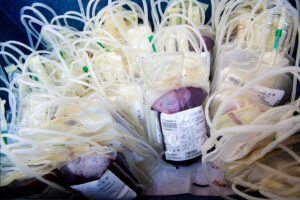Early transfusion is associated with reduced morbidity and mortality in major bleeding trauma events. However, the optimal mix of blood products and the best hemostatic/coagulation assays to guide massive transfusion protocols for major trauma remain unclear. To clarify the evidence, the Cochrane Library performed a meta-analysis on all published randomized controlled trials (RCTs) through November 2023. Across 18 RCTs enrolling more than 5,000 patients aged 16 years and over, no clear consensus was found on the optimal transfusion strategy for bleeding trauma patients. In five RCTs comparing pre-hospitalization transfusion strategies, no differences were found between transfusing plasma (fresh frozen plasma or lyophilized) versus standard care at 24 hours or 30 days for both mortality and thromboembolic events. Furthermore, in eleven RCTs comparing in-hospital transfusion strategies, no differences in mortality or thromboembolic events were found for evaluated transfusion strategies—cryoprecipitate plus standard major hemorrhage protocol (MHP) verses MHP, differing ratios of blood products (a 1:1:1 ratio of plasma:platelets:RBCs vs a 1:1:2 ratio), or whole blood versus individual blood products. Evidence was also insufficient to determine whether viscoelastic hemostatic assays or conventional laboratory coagulation tests better guide transfusion decisions. Interpretation of the meta-analysis was limited by heterogeneity in interventions and outcome measures across the 18 RCTs. More research is needed to define the best transfusion strategies for trauma patients with major bleeding.
Reference:

